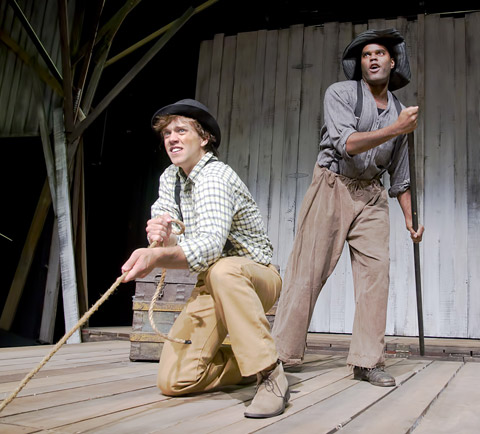
SOUND HEART What this production lacks in money and machinery, it makes up for in spirit. |
Compared to the mighty Mississippi, Big River is just a Tony-winning tributary. But to borrow a lyric from its composer, Roger Miller, the show climbs on the river's back and rides. When the musical based on Mark Twain's Adventures of Huckleberry Finn debuted at the American Repertory Theater in 1984, from whence it rafted on to Broadway and a passel of prizes, scenic designer Heidi Landesman performed an exhilarating trick: as the titular rapscallion and his escaping-slave companion, Jim, pushed off on their journey, the river billowed like a great blue ribbon. The Lyric Stage Company of Boston, which is reviving the work (through October 8), probably lacks the machinery and money for that. But designer Janie E. Howland has an effective device of her own — the river, complete with dappling sunrises, darkness pinged with rain, and lights on shore, comes to life through projections, often in triplicate. And it does seem to move, carrying Huck and Jim toward their "considerable trouble and considerable joy."Neither the theater piece — which intersperses "King of the Road" tunesmith Miller's score with a first-person narrative by William Hauptman — nor director Spiro Veloudos supply Twain's wryly anti-racist 1884 tome with much satiric edge or true grit. And with his clean plaid shirt and age-of-innocence face, Jordan Ahnquist's Huck hardly defies "sivilizin'," even by Widow Douglas and Miss Watson's God-fearing standards. But the production is well sung and aptly rollicking when it isn't being soulful (or, in the case of Phil Tayler's Tom Sawyer, in whom ADHD has been grafted onto dangerous imagination, too rollicking). And Big River, particularly in its first act, is a winning show that hews pretty close to those elements of the novel it retains — including the mid-19th-century Southern vernacular and, unlike the recently published NewSouth Books version of the novel, some limited use of the n-word.
It was a capital idea to entrust the Big River score to Miller, whose mix of country fiddling, talking blues, novelty numbers, and simple, plaintive ballads suits both the sleeve-worn sentiment and stripped-down staging. The duets for Huck and Jim, including the buoyant "Muddy Water" and "River in the Rain," with its catchy rhythms and poetic touch, are both soaring and sweet. There's nice harmonizing here by Ahnquist and De'Lon Grant, whose Jim holds back on his reactions to some of the indignities perpetrated on him but does no such thing when it comes to his impressive baritone. The other vocalist who raises goosebumps is Kami Rushell Smith, who applies her classical pipes to gospel and even some scatting.
Twain called Huckleberry Finn "a book of mine where a sound heart and a deformed conscience come into collision and conscience suffers defeat." During his coming-of-age idyll on the river, Huck does indeed wrestle with the twisted moral code that wants to tell him decency is deviltry. But even as that struggle plays out in the second act of Big River, it must do so to weaker lyrics and tunes, including those of "Worlds Apart," the rather soupy duo in which Huck comes to understand his and Jim's mutual humanity.
 Topics
Topics:
Theater
, Roger Miller, Theater, Mark Twain, More  , Roger Miller, Theater, Mark Twain, Civil War, Slavery, Big River, Less
, Roger Miller, Theater, Mark Twain, Civil War, Slavery, Big River, Less 